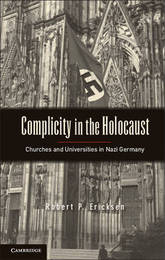
|
Complicity in the Holocaust: Churches and Universities in Nazi Germany
Hardback
Main Details
| Title |
Complicity in the Holocaust: Churches and Universities in Nazi Germany
|
| Authors and Contributors |
By (author) Robert P. Ericksen
|
| Physical Properties |
| Format:Hardback | | Pages:280 | | Dimensions(mm): Height 229,Width 152 |
|
| Category/Genre | The Holocaust |
|---|
| ISBN/Barcode |
9781107015913
|
| Classifications | Dewey:940.53180943 |
|---|
| Audience | | Tertiary Education (US: College) | | Professional & Vocational | |
|---|
| Illustrations |
Worked examples or Exercises
|
|
Publishing Details |
| Publisher |
Cambridge University Press
|
| Imprint |
Cambridge University Press
|
| Publication Date |
5 February 2012 |
| Publication Country |
United Kingdom
|
Description
In one of the darker aspects of Nazi Germany, churches and universities - generally respected institutions - grew to accept and support Nazi ideology. Robert P. Ericksen explains how an advanced, highly educated, Christian nation could commit the crimes of the Holocaust. This book describes how Germany's intellectual and spiritual leaders enthusiastically partnered with Hitler's regime, thus becoming active participants in the persecution of Jews, and ultimately, in the Holocaust. Ericksen also examines Germany's deeply flawed yet successful postwar policy of denazification in these institutions. Complicity in the Holocaust argues that enthusiasm for Hitler within churches and universities effectively gave Germans permission to participate in the Nazi regime.
Author Biography
Robert P. Ericksen is Kurt Mayer Chair in Holocaust Studies and Professor of History at Pacific Lutheran University. Ericksen is also a Fellow of the Alexander Von Humboldt Foundation. He is on the editorial boards of the journals Kirchliche Zeitgeschicte (Contemporary Church History) and Association of Contemporary Church Historians. Ericksen is the author of Theologians under Hitler: Gerhard Kittel, Paul Althaus and Emanuel Hirsch (1985) and co-editor of Betrayal: German Churches and the Holocaust (1999).
Reviews'Based on decades of his own research and complete mastery of both German- and English-language scholarship in the field, Robert Ericksen demonstrates convincingly how a critical mass of churchmen and academics in Germany enthusiastically embraced the Nazi regime and provided the rationalizations and adjustment of moral norms that permitted ordinary Germans to accept and even implement the regime's brutal and murderous policies.' Christopher R. Browning, Frank Porter Graham Professor of History, University of North Carolina, Chapel Hill 'Robert P. Ericksen has given us a masterful comparative study of the churches and the universities in Nazi Germany. Two institutions entrusted to foster the collective conscience and intellect of the German people are revealed to have compromised their integrity by collaborating in the Holocaust, despite the fact that Jews had been crucial in creating Christianity (Jesus and Paul) and enhancing German academic scholarship.' Susannah Heschel, author of The Aryan Jesus: Christian Theologians and the Bible in Nazi Germany (2008) 'Robert P. Ericksen's reputation as an important authority on Nazi Germany and the Holocaust is based not only on his careful and original scholarship, but also on his insistence on moral clarity. He does not shirk from assigning individual and collective responsibility for the crimes of Nazism. This book makes compelling reading, and will most certainly stimulate debate among its many readers.' Alan E. Steinweis, University of Vermont 'The book is written in a calm, fluent style, easy to read and brimming with careful research, accessible to the general reader ... it deserves to be celebrated for its moral courage, lucid prose and splendid craftsmanship - in spite of its complex and emotive content, it reads with beguiling simplicity. Ericksen presents a damning case against the German Church and academy. And by pointing the finger so consistently at educational and moral leaders, he raises questions pertinent to today. Are there evils in twenty-first-century society that universities and the Church could do more to speak out against?' The Times Higher Education Supplement '... a thoroughly successful summary ...' Dirk Schuster, Arbeitstitel 'Ericksen's book is helpful because it begins the story of complicity not in 1933, with the rise of Adolf Hitler to the chancellorship, but instead in 1923, with the decade-long religious and ideological tumultuousness that marked the Weimar Republic.' Charles Gallagher, German Studies Review '... a compelling piece of scholarship that is eminently readable, frequently thought-provoking, and deeply insightful.' Derek Hastings, The Catholic Historical Review 'More forcefully and uncompromisingly than any other Holocaust scholar, Ericksen argues for the importance of churches and universities to Nazi-era Germans. ... Ericksen's assessments of American occupation policy and post-war discourse on the role of the clergy and universities in the Holocaust are among his most crucial contributions.' Paul Bookbinder, European History Quarterly
|